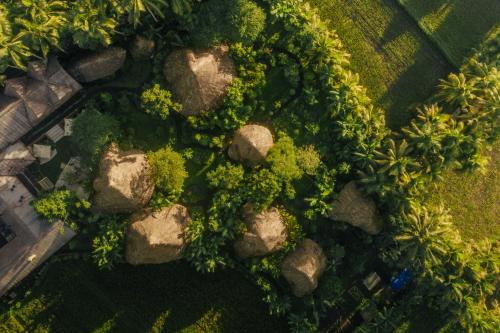
DEVELOPING SUSTAINABILITY STRATEGIES USING SYSTEMS MAPPING TECHNIQUE
This project equipped students with problem-solving skills to address complex sustainability challenges within Southeast Asia’s distinctive local and cultural contexts. Students learned both in Singapore and on-site in Indonesia through immersive experiences, project meetings, and collaborative presentations that bridged theory with practice.
Mana Earthly Paradise, an eco-resort located in Bali, Indonesia, was the partner organisation for this project. Renowned for its commitment to sustainable living, the resort blended Balinese cultural heritage with modern comforts while minimising environmental impact. Its offerings included eco-friendly accommodation, wellness programmes, traditional cultural experiences, and educational tours featuring in-house organic gardens, waste management systems, and renewable energy initiatives. Guests were also invited to participate in conservation and sustainability activities.
While Mana Earthly Paradise had embedded sustainability at its core, it sought fresh perspectives and innovative strategies to deepen its impact further. Building upon an already sustainable model presented a unique challenge that required highly creative, evidence-based, and context-sensitive approaches. Sustainability itself demanded systems thinking to understand interconnections and avoid unintended consequences that could arise elsewhere in the ecosystem.
Through this project, students discovered that sustainability went beyond eco-friendly operations. It encompassed broader dimensions such as community empowerment, women’s empowerment, cultural preservation, and local economic development—all of which were deeply intertwined with sustainable outcomes. They learned to think creatively, appreciate how small actions could lead to meaningful change, and recognise that incremental, well-managed improvements often achieved more lasting impact than abrupt, large-scale interventions.
By the end of the project, students had developed the ability to pitch evidence-based recommendations to diverse stakeholders, supporting Mana Earthly Paradise in strengthening its business model for long-term sustainability. In doing so, they contributed to creating shared value for guests, local communities, and the wider tourism ecosystem. This experiential learning journey enabled students to apply sustainability theories in real-world contexts, develop culturally attuned solutions, and advance sustainable tourism practices across Southeast Asia.
To develop their final recommendations, students undertook a rigorous consultation and analysis process grounded in systems thinking. They began by conducting interviews and informal discussions with a range of internal and external stakeholders to better understand operational realities, stakeholder needs, and the underlying dynamics shaping sustainability at Mana Earthly Paradise.
Drawing on these insights, the teams created detailed systems maps that visualised key components and interconnections across the resort’s operations and its wider community ecosystem. By mapping causal relationships and identifying feedback loops, they were able to analyse which patterns reinforced or hindered the resort’s sustainability goals. Their decision-making process was iterative and reflective, integrating stakeholder inputs with theoretical frameworks to ensure that their proposed strategies were both contextually relevant and systemically robust.
Students soon realised that enhancing sustainability in an organisation already deeply committed to sustainable practices posed a distinctive challenge. It demanded innovative yet practical solutions that avoided unintended trade-offs elsewhere in the system. Through this process, they discovered that sustainability extended far beyond environmental practices—it encompassed community empowerment, gender inclusion, cultural preservation, and economic resilience.
This deeper understanding encouraged them to think beyond conventional recommendations and recognise the value of small, incremental actions that could be realistically implemented and scaled over time. Such actions, they learned, often proved more effective in steering systems gradually toward greater sustainability than large, abrupt interventions.
The experience also strengthened their ability to analyse complex problems holistically, synthesise diverse perspectives, and communicate their ideas persuasively to different stakeholders with clarity and confidence.
========================
The students worked in teams to develop a diverse range of innovative recommendations that demonstrated both creativity and systems thinking in advancing Mana Earthly Paradise’s sustainability goals.
One group reimagined guest engagement through a cause-driven loyalty programme where customers earned points for sustainable actions or purchases and donated these points to environmental or social causes—creating a new kind of value exchange rooted in giving rather than personal reward. Another team focused on integrating nature-based solutions to enhance guest wellbeing and environmental harmony, proposing ideas such as passive lighting using reflective pebbles, bamboo flood walls and biopores for flood management, and the use of ducks for natural pest control—all blending seamlessly with the resort’s ecological and cultural setting.
A third group explored how sustainability practices could be made more visible and engaging for guests. Their ideas included branded waste collection points, a vertical farm, and tie-dyed keepsakes made from food scraps—simple yet impactful interventions that combined education with participation, subtly influencing guest behaviour while strengthening the resort’s sustainability narrative. The final team developed a regenerative “farm-to-table-to-farm” concept that enhanced organic waste management through the use of Black Soldier Fly larvae, effectively closing waste loops while creating opportunities for guest learning and immersive storytelling.
Together, these projects highlighted students’ ability to think holistically and translate complex systems analysis into practical, actionable strategies. Their ideas ranged from small, implementable changes to transformative concepts capable of reshaping both guest perceptions and resort operations. Collectively, the outcomes reflected a deep appreciation that sustainability extends beyond environmental care—it is about community empowerment, cultural authenticity, and regenerative practices that enrich both people and place.
Industry Partners:
“A lot of the recommendations are really great! There are actually two recommendations that we can implement straight away. The tie-dye-keepsakes is something we have been doing at home but we never thought about implementing it in the resort. The reflective pebbles is another innovative idea, I have seen this used in Japan rural areas. This idea is so simple, yet we have not thought about it. Another innovative recommendation is the cause-based loyalty program, I think this idea can really work for our resort”
Student Reflection (videos):
May Myat Noe Khin (SOSS)
https://drive.google.com/file/d/1HuR5vHIRz6S-t7FaAvROWELrWQU_ar2X/view?usp=sharing
Chriscavin Wijaya (CIS)
https://drive.google.com/file/d/1RXPhM6tXHllibqKHcebPVTPedSterID3/view?usp=sharing
Ili Adilah binte Hanafi (SOSS)
https://drive.google.com/file/d/198iZ1ibZf0i1vFqIbdzB7i20Rq8ABxQj/view?usp=sharing
Asha Balamurali (SOSS)
https://drive.google.com/file/d/1xPR-pnUfl3AfbpUN9cALW59cthUESbsI/view?usp=sharing
Koh Jun Peng (SOSS)
https://www.youtube.com/watch?v=oSeG8L7AOa8
Alexis Cheong (SOSS)
https://www.canva.com/design/DAGoFnFsXfo/lPE6jfYLTdaSdr6G06BUrA/watch?utm_content=DAGoFnFsXfo&utm_campaign=designshare&utm_medium=link2&utm_source=uniquelinks&utlId=h0f3de144f3
Tan Huai En (SCIS)
https://drive.google.com/file/d/1h-LTWDEqAS0lCJuYLMvBL73_q6XQ_hCX/view?usp=sharing